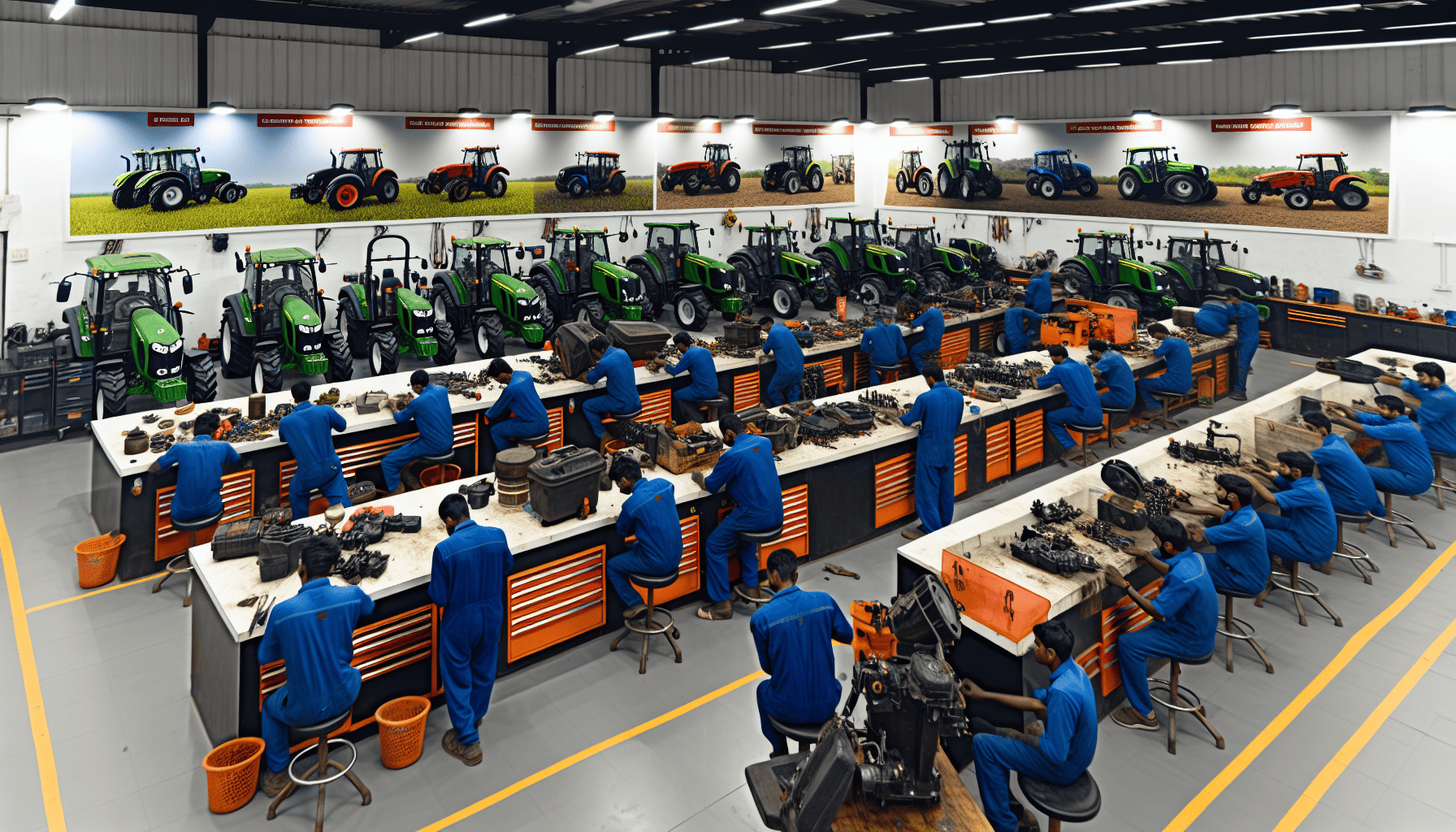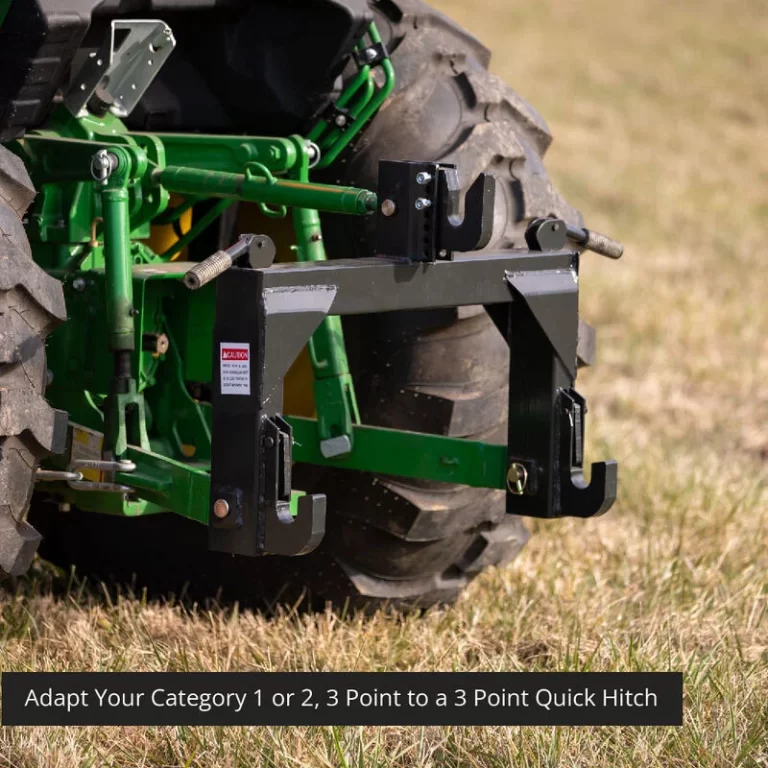Essential Tractor Maintenance Tips for Long-Lasting Farm Equipment

Maximizing the lifespan of your tractor hinges on regular maintenance. If you’re wondering where to start or how to avoid costly repairs, this article provides you with vital tractor maintenance strategies. From the simplest daily checks to in-depth seasonal adjustments, you’ll learn how to keep your tractor in top condition.
Key Takeaways
Consistent, routine maintenance of tractors, including fluid checks and component inspections, is essential for machinery longevity, safety, and operational efficiency.
Modern tractors with advanced features require specialized maintenance, and professional service departments are advantageous for complex repairs to reduce downtime and enhance safety.
Investing in preventative maintenance and timely repairs can result in significant cost savings, highlighting the importance of a proactive maintenance strategy and the use of high-quality parts and fluids.
The Essentials of Tractor Maintenance

Recognizing the value of consistent upkeep is paramount for those dependent on tractors in their daily operations. This routine attention to your machine constitutes an investment in its durability and contributes to preserving its value when sold. By allocating a modest amount of time prior to each use, along with reserving several hours annually for more extensive maintenance routines, you can ensure optimal performance from your tractor over time.
Consider these strategies for effective tractor preservation.
Employ premium-grade engine oil, lubricants, and fuels
Make well-informed decisions regarding upkeep tasks
Routinely inspect filters and replace them as necessary
Monitor and cleanse the air intake system regularly
Verify tire pressure frequently and adjust it accordingly
Consistently clean the tractor to eliminate debris accumulation
Store your machinery in an environment that’s both dry and secure
Adhering diligently to these practices will help minimize expenditures associated with repairs or ongoing maintenance requirements.
It’s crucially important to always have access to a comprehensive checklist tailored specifically for maintaining tractors. This becomes invaluable as you become familiar with the particular care demands of your equipment. Such a list confirms that no critical procedure is missed—from conducting regular oil changes within the engine to meticulous tire management—all components are equally fundamental in ensuring seamless operation of your agricultural asset.
Understanding Your Tractor’s Maintenance Needs
Recognizing the particular requirements of a tractor is essential for its upkeep. The owner’s manual for your tractor offers an abundance of detailed guidance, including maintenance suggestions and specific inspection guidelines that are customized to your model. It details:
Schedules for service
Important areas requiring attention during service
Tasks that should be done on a daily basis
Recurring upkeep tasks like monitoring oil levels each day and switching out engine oil along with filters every 200 hours or at least once per year.
It’s also vital to maintain a stockpile of necessary parts as advised in the manual. This facilitates prompt repairs and part replacements, which helps reduce downtime in agricultural operations.
Organizing Your Maintenance Schedule
Efficiently organizing a maintenance schedule is crucial for the optimal operation and longevity of your tractor. By adhering to a maintenance plan based on the manufacturer’s recommended intervals, you can avoid unforeseen equipment breakdowns and maintain your tractor in excellent condition. Structured service intervals detailed in the tractor’s manual should guide scheduling tasks, including inspecting the air filter every 10 hours and replacing it after every 500 hours.
Utilizing checklists can streamline routine examinations of vital components like air filters and fuel filters. Keeping records of maintenance checks plays an important role in early identification of potential problems, which supports sustained health for your tractor over long periods.
Key Steps in Routine Tractor Upkeep

Maintaining a tractor requires various essential routine checks. Everyday inspections should assess levels of engine oil and fuel, as well as coolant, while also evaluating tire integrity and air pressure among other things. It’s crucial to conduct systematic reviews that encompass examining the status of air and fuel filters, scrutinizing fuel conditions, assessing both engine oil and its filter, checking blade attachments along with hydraulic systems components wheels battery belts grease points paintwork chassis structure and all supplementary connections Constant vigilant maintenance can considerably extend your tractor’s serviceable life.
To these regular observations, critical upkeep tasks are key in enhancing both durability and performance of tractors. Key procedures include lubricating with grease guns applying liquid lubricants on engine hoods hinges which reduces wear tear and prevents rust A monthly high-pressure wash is advised for eliminating any accumulated dirt or debris Neglecting such cleanliness can result in rust internal damage from neglect.
By committing diligently to these tasks focused on engine maintenance, you help ensure that your tractor remains running smoothly at peak efficiency.
Daily Visual Checks and Fluid Level Inspections
Conducting routine visual inspections and checking the fluid levels are crucial for maintaining your tractor’s peak functionality. Ensure you look out for:
Any indicators of deterioration, like parts that are either detached or missing, along with any damages on the tires.
Potential leaks which could suggest issues with fluids.
The amounts of coolant in both engine and radiator to avoid overheating and maintain efficient function.
Maintaining these fluids at appropriate levels is essential for avoiding operational heat-related problems.
Before using your tractor, it’s important to check vital fluid levels such as engine oil level and hydraulic fluid to protect its internal mechanisms from damage. Consistently monitor tire pressure according to suggested standards based on expected usage in order to minimize wear while optimizing fuel economy.
Regular Engine and Transmission Care
Maintaining your tractor’s engine and transmission is essential for optimal performance. Consider these key maintenance activities:
Initially, replace the engine oil after 50 hours of use on your tractor, then continue to do so every subsequent 100 hours.
When fuel filters become obstructed, it’s important to change them out to keep harmful contaminants from impacting the smooth functioning of your tractor.
It is also critical to consistently secure all bolts and nuts associated with the engine and transmission in order to avoid any damage or excessive vibration during the operation of your tractor.
Adherence to these tasks will help maintain your tractor in peak working condition.
Having a reserve supply of necessary components such as filters, oils, coolants, and belts enables you to promptly carry out maintenance procedures thereby minimizing operational interruptions.
Tire Pressure and Electrical System Monitoring
For optimal performance and safety, it’s critical to monitor your tractor’s tire pressure and maintain its electrical system. Here are some important steps to follow.
Regularly check your tractor’s tire pressure to ensure correct inflation. This minimizes soil compaction, maximizes traction through better ground contact, enhances ride quality, and extends the lifespan of tractor tires.
Watch out for irregular tread patterns, sidewall issues, or signs of wear on your tractor’s tires. Address any issues promptly to prevent further damage.
Maintain your tractor’s electrical system by regularly inspecting the battery, wiring, and connections. Clean and tighten connections as needed to ensure proper functioning.
By following these steps, you can prolong the life of your tractor’s tires and ensure optimal performance and safety.
Moreover, maintaining the tractor’s electrical system and other electrical systems, which includes ensuring the battery is securely held, connections are clean, and the electrolyte level is sufficient, can prevent unexpected equipment failures.
Advanced Maintenance Techniques for Modern Tractors

Modern tractors, adorned with advanced safety features like seat belts, brakes, levers, safety switches, and hazard lights, require meticulous upkeep to guarantee their proper functioning. These enhanced characteristics necessitate routine inspections.
It is imperative that a service for the transmission system be conducted at intervals of every 500 hours. This service should include changing out the transmission fluid to preserve both the performance and efficacy of these contemporary agricultural machines.
Due to the sophisticated technical nature of newer tractor models, in contrast to their predecessors’ simpler designs, there’s an elevated requirement for specialized maintenance techniques. Consequently, this shift may influence repair costs by modifying its structure.
Handling High-Tech Components with Care
Special care is required when dealing with the high-tech components of modern tractors. A routine walk around the tractor to check that all lights and flashers are functioning is crucial for both safety and to maintain electrical system integrity. Also, keeping a supply of color-coded fuses with clear ampere ratings on hand is important for quickly resolving electrical circuit issues.
For complex issues beyond basic maintenance, employing a qualified dealer with trained technicians who are knowledgeable about the latest tractor repair techniques can provide efficient diagnosis and repair.
Maintaining Hydraulic Systems and Air Filters
Consistent maintenance of both air filters and the hydraulic system is vital for the tractor to function efficiently. To maintain your tractor effectively, consider these essential guidelines:
Weekly inspections of the hydraulic system are imperative to catch and curb contaminants that can impede service reliability.
Use only the viscosity level of hydraulic fluid prescribed by your tractor’s manufacturer.
Refrain from intermixing various brands or viscosities, as well as different types of hydraulic fluids. This practice could damage the integrity of your hydraulic system.
By adhering to these practices, you’ll help safeguard the health of your tractor’s hydraulics.
It’s crucial for maintaining engine efficiency that you inspect and attend to air filters along with examining fuel filters at intervals not exceeding every 50 hours spent in operation—clean them if necessary or replace them when required.
Seasonal Adjustments and Long-Term Storage Solutions
As with all types of equipment, tractors experience the impact of fluctuating weather conditions and necessitate appropriate maintenance during prolonged storage. Adequate preparation is critical whether you are gearing up for harsh climatic changes or in search of reliable long-term storage methods to avoid unwarranted deterioration.
To avert rust formation on both the inside and outside when a tractor is stored for an extended duration, it’s advisable to administer a liquid lubricant onto the engine hood and its hinges.
Preparing for Extreme Weather Conditions
Ensuring your tractor is ready for harsh winter conditions is of paramount importance. Prior to the onset of winter, it’s vital to test and modify the antifreeze levels using an antifreeze tester so that it can endure the season’s coldest temperatures. Keep your tractor in a warm space or protect it with a waterproof tarp.
Equally important during this time is keeping an eye on tire pressure as lower temperatures can cause significant drops. Make adjustments accordingly and watch for any notable loss of air throughout the season. When dealing with diesel engines, incorporate an anti-gel additive into the fuel which will help stop wax from solidifying in cold weather and clogging up fuel lines.
Storing Your Tractor Correctly
Proper storage is critical in preserving the long-term performance of your tractor. Utilizing vapor corrosion inhibitors can help protect against moisture by emitting a protective gas that envelops metal parts, effectively guarding them from rust. Using anti-rust products on your tractor assists in managing maintenance expenses by extending the life of equipment and mitigating the need for early replacement of components.
To shield engine components from damage and stave off corrosion, it’s crucial to store your tractor in an environment that offers protection against severe winter conditions which could harm the tractor engine.
Preventative Maintenance: Beyond the Basics
The core concept of preventative maintenance is anchored in the proactive and systematic approach to averting breakdowns and malfunctions before they occur. By embracing regular upkeep, including consistent oil changes, periodic filter swaps, and thorough brake checks, one makes a strategic investment towards ensuring future performance and dependability of their tractor. This goes above simple routine maintenance measures by focusing on foresight rather than reactionary fixes.
Implementing a Proactive Maintenance Mindset
Adopting a preventive approach to maintenance, which includes routine inspections, prompt repair work, and consistent observation of your tractor’s functionality, not only protects the integrity of engine parts and ensures efficient operation, but also serves as an early detection mechanism for small issues before they escalate into significant setbacks.
Through diligent adherence to scheduled maintenance and swiftly dealing with smaller repairs when they arise, owners of tractors can circumvent expensive major repairs in the future. This strategy proves instrumental in controlling yearly expenditures related to the upkeep and fixing of their machinery.
Recognizing When to Replace Parts
Understanding the appropriate timing for part replacements is crucial in tractor upkeep. Key components that often necessitate substitution due to deterioration include:
Engines
Transmissions
Axles
Brakes
Filters
Oil
Steering elements
It’s essential to frequently apply grease and lubricants to joints including the drive shaft, front axle, brake arm pivot, and steering ram as a measure against early wear.
Routine examination of hydraulic fluids through fluid analysis can provide insights into the condition and longevity of these fluids while facilitating preemptive identification of parts that might need replacing.
Maximizing Efficiency Through Proper Tractor Care

Maintaining a tractor with the correct care procedures ensures that it operates at maximum efficiency and prolongs the machine’s useful life. Educating operators on how to use a tractor efficiently while performing routine maintenance can both accelerate agricultural work and enhance the longevity of the vehicle.
Adhering to a consistent service timetable is essential for preserving peak performance in your tractor.
Fuel Efficiency and Performance Gains
Proper maintenance can boost both the fuel efficiency and performance of your tractor. By utilizing top-notch fuel conditioners, one can improve the quality of their fuel, which in turn maximizes engine effectiveness and enhances the overall operation of a tractor. Performance improvements and more efficient use of fuel stem from conscientious upkeep practices that include actions such as cleaning out radiator screens, exchanging old air and fuel filters for new ones, maintaining service on fuel injectors, and employing oils along with lubricants specifically tailored to farming machinery.
Employing the Gear Up and Throttle Down (GUTD) method when driving is an effective strategy for conserving diesel or gas – it involves selecting a higher gear while dialing back on engine speed whenever full power isn’t essential for tractor tasks.
Reducing Downtime and Increasing Output
Ensuring that a tractor and related equipment run at optimal levels involves committing to regular maintenance, which can lead to significant cost savings. Up to a 25% reduction in machine costs might be realized through cutting down on unforeseen outages. Here are some effective strategies for achieving better efficiency:
Rotating equipment so that each piece has downtime allowing for comprehensive inspections and necessary repairs
Establishing a proactive service schedule designed to detect and resolve issues before they interrupt operations
Training personnel thoroughly in the correct operation and upkeep of machinery, thus reducing mishaps caused by operator error
Through these methods, you’ll be able not only to decrease unexpected expenses associated with unexpected breakdowns, but also enhance overall productivity.
Opting for the service department of your tractor dealership can streamline repair processes. This choice promotes reduced interruption times and expedited restoration back into operation while preserving high levels of productivity. Such an approach ensures both swift resolution of issues as well as continuous efficient use of your farm machinery.
Investing in Tractor Service and Repairs

Maintaining and repairing your tractor is crucial for preserving the machine’s efficiency. The advantages of utilizing professional service departments for tractors are numerous.
They possess specialized tools and have technicians with specific training to handle intricate repairs, thereby minimizing downtime.
Such dealerships can keep a steady supply or swiftly procure necessary parts.
Routine inspections for any tractor recalls lead to expedited repairs, significantly improving machine safety.
Choosing the Right Dealer for Service
Selecting a dealer for service that can provide your tractor with the utmost care is crucial when making a choice. A dependable service dealer often comes recommended by local farmers and those living nearby who speak highly of their experiences. The sustained presence of a dealer in an area, coupled with customer praise, are indicators of their esteemed reputation.
The competence demonstrated by the staff at a dealership reflects their proficiency. Engaging conversations about maintenance and performance are more valuable than simply focusing on sales pitches.
The Cost-Benefit Analysis of Timely Repairs
Recognizing the financial advantages of prompt repair work on tractors is crucial. When repairs are dealt with swiftly, it can stop small problems from escalating into larger, more costly ones.
Seeking out skilled service departments for early-stage tractor repairs can lead to substantial savings in the long run.
Summary
To summarize, it is crucial to conduct consistent and meticulous maintenance to prolong the lifespan of your tractor and guarantee its efficient functioning. This involves recognizing the maintenance requirements, establishing a schedule for upkeep, performing routine checks and assessments, managing advanced technology parts, readying the machinery for severe weather conditions, and adopting an anticipatory approach toward maintaining performance. Opting for a reputable dealer for servicing needs and appreciating the value gained from prompt repairs also play significant roles in boosting both longevity and operational efficiency of your tractor.
Frequently Asked Questions
What are the routine maintenance of a tractor?
Carry out the following five routine maintenance tasks every day: examine fluid levels, evaluate tires and wheels, ensure batteries are fastened securely, and review the overall state of your tractor.
Consistent upkeep is essential to maintain your tractor in optimal operating order.
What are the maintenance required for a tractor?
In order to keep a tractor running smoothly, it is crucial to change the oil filter after its initial 50 hours of use and subsequently every 200 hours. Draining the fuel/water separator should be done at each interval of 50 hours, with its replacement taking place after every 100-hour period or according to necessity.
It’s also important for the upkeep of your tractor that you replace the fuel filter once you hit 500 operating hours or whenever necessary based on its condition.
What are the service intervals for a tractor?
It is essential to perform regular maintenance on your tractor’s engine, which includes servicing it every 100 hours. You must change the oil and replace the filter while also examining various components for issues at an interval of every 200 hours.
Ensuring consistent upkeep is vital in maintaining the seamless operation of your tractor.
Why is regular maintenance crucial for tractors?
Maintenance performed routinely on tractors is essential to avoid expensive repairs, guarantee their safe use, and preserve their value for potential resale.
What is a proactive maintenance mindset?
In summary, adopting a forward-thinking approach to maintenance involves consistently conducting inspections, promptly addressing repairs, and constantly observing the engine’s components to preserve their functionality and ensure efficient performance.
This strategy also serves as a preventive measure by catching small concerns early on before they have the chance to escalate into significant complications.






One Comment